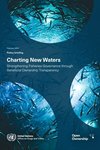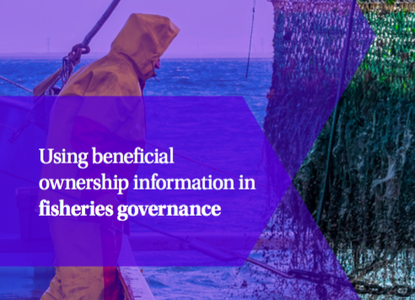Charting New Waters: Strengthening Fisheries Governance through Beneficial Ownership Transparency
Help us understand how you are making use of resources from the Open Ownership website by filling out this short survey
Publication type
Briefing
Publication
Sections
Implementation
Summary
A growing body of civil society and multilateral organizations are calling for greater beneficial ownership transparency in the fisheries sector – that is, the collection, sharing and use of information about the beneficial owners of fishing activities.
In this briefing, the United Nations Office on Drugs and Crime (UNODC) and Open Ownership outline actions that various groups – including governments, regional fisheries management organizations, industry actors and investors, and civil society organizations – can take to begin operationalizing the use of beneficial ownership information in the fisheries sector.
Key Points
A growing body of civil society and multilateral organizations are calling for greater beneficial ownership transparency in the fisheries sector – that is, the collection, sharing and use of information about the beneficial owners of fishing activities. The systematic use of beneficial ownership information within the sector could significantly improve fisheries governance by:
- Improving the fisheries licensing process and participation.
- Assisting the detection and investigation of corruption and other crimes in the fisheries sector.
- Improving fisheries policy through better monitoring, evaluation and oversight.
The majority of countries have implemented or are implementing central beneficial ownership registers for corporate vehicles across different sectors of their economies to comply with international anti-money-laundering standards. These efforts can be leveraged to help improve accountability and sustainability of the fisheries sector. This briefing outlines actions that various groups could take to begin operationalizing the use of beneficial ownership information in the fisheries sector:
- Governments should ensure a robust foundation for beneficial ownership transparency reforms for corporate vehicles in law and sufficient access to information to relevant user groups, based on broad consultations. There should be a whole-of-government approach to collecting, verifying and sharing beneficial ownership information for corporate vehicles, with coordination mechanisms among agencies to connect this information with asset registers such as those for fishing licenses and vessel. These should collect sufficient information about relevant interests and reliable identifiers for the corporate vehicles involved so information can be connected automatically and at scale. Adding crimes in the fisheries sector as predicate offenses for money laundering may help leverage existing information-sharing frameworks.
- Regional fisheries management organizations should encourage and require Member States to adopt implementation standards for their registers and help facilitate the regional sharing of domestic information among member countries.
- Industry actors and investors should embed the use of beneficial ownership information into due diligence checks and other business processes.
- Civil society organizations should call for greater transparency in the fisheries sector and proactively use beneficial ownership information in research and investigations.

